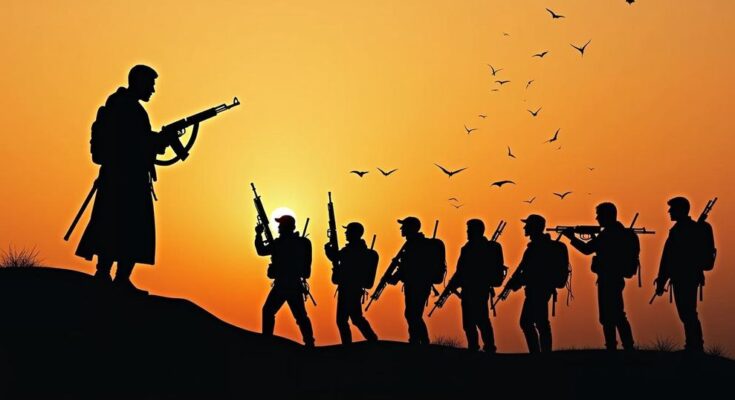In response to the killing of Hezbollah leader Hassan Nasrallah, Iraqis expressed anger and sorrow, participating in nationwide protests and mourning vigils. Prime Minister Mohammed Shia al-Sudani condemned Israel’s actions, calling for a three-day mourning period. Leaders across Iraq’s political spectrum criticized Israel’s aggression, while local communities launched donation campaigns for Lebanon, reflecting widespread resolve to continue resisting Israeli occupation and oppression in the region.
In the aftermath of the lethal attack on Hezbollah leader Hassan Nasrallah, Iraq has witnessed a profound wave of mourning and outrage among its populace. Residents from diverse regions, including the Nineveh Plain, organized solidarity vigils condemning Israeli aggression just prior to learning of Nasrallah’s death. Imad Qusay Abbas, a 30-year-old from the north-eastern area of Mosul, expressed his shock upon returning from one such vigil to receive the tragic news. “We never imagined that we would return from the solidarity vigil and hear the news of the martyrdom of Nasrallah,” he stated. After Hezbollah confirmed Nasrallah’s death, large crowds poured into the streets from Basra to Baghdad, signaling their grief and unity with other oppressed communities in the region. In Baghdad, demonstrators attempted to besiege the Green Zone, which houses the US embassy, echoing sentiments that Nasrallah’s assassination exemplifies a significant erosion of global order. Prominent Iraqi figures across the political spectrum criticized Israel’s actions. Prime Minister Mohammed Shia al-Sudani referred to the incident as a “shameful” act that violated fundamental boundaries of acceptable conduct, labeling Nasrallah a martyr and declaring a three-day mourning period. Influential Shia cleric Muqtada al-Sadr commemorated Nasrallah as a steadfast figure within the resistance movement, stating, “Farewell to the companion of the path of resistance and defiance.” Meanwhile, the Secretary-General of Kata’ib Sayyid al-Shuhada emphasized Iraq’s support for Lebanon amid ongoing strife, asserting that their nation would not tolerate a siege upon it. In a show of solidarity, donations for the Lebanese people began to be collected across Iraqi municipalities at the urging of Sayyid Ali al-Sistani, the highest Shia authority in Iraq. In Khazna, east of Mosul, a significant mourning ceremony highlighted the enduring influence Nasrallah is expected to have on his followers. Attendees unveiled a large portrait in his honor, asserting that his legacy would persist regardless of his physical absence. Sheikh Hassan Al-Shabaki remarked, “Nasrallah entered history through its widest doors,” suggesting that Israel’s attempt to eliminate him only serves to solidify his status in the collective consciousness of the populace. Despite an atmosphere of mourning, voices of resilience emerged, with individuals like Duraid Fadhel emphasizing that Hezbollah would emerge stronger from this tragedy. These sentiments, however, were accompanied by apprehensions about the potential for further escalation of the conflict into Iraq, with individuals like Imad noting, “The Zionist entity is exterminating the Palestinians and now it is exterminating the Lebanese, and Iraq’s turn is coming.”
The events in Iraq following the assassination of Hezbollah leader Hassan Nasrallah reflect deep-rooted sentiments of resistance against Israeli actions in the region. Historically, Hezbollah has been regarded as a key player in the resistance against Israeli forces, garnering significant support from various factions within Iraq, particularly among Shia communities aligned with Iran. The perceived threat from Israel and ongoing conflicts in Lebanon and Palestine have fostered a sense of solidarity and urgency among Iraqis to stand against what they view as aggression. The emotional response to Nasrallah’s death notably underscores the interconnected nature of Middle Eastern politics, where local events can resonate widely, instigating protests and acts of solidarity across borders. This recent wave of demonstrations illustrates the heightened tensions and fears of regional destabilization fueled by conflicts that have long plagued the Middle East.
The assassination of Hassan Nasrallah has ignited a strong emotional reaction in Iraq, characterized by mourning, outrage, and a collective vow to resist against perceived Israeli aggression. Prominent leaders and citizens alike have expressed solidarity with Lebanon, emphasizing a sense of shared struggle and resilience. While the event has brought communities together in grief, it also raises concerns about the future escalation of conflict in the region, particularly regarding the implications for Iraq and its people as they face the potential for further violence.
Original Source: www.aljazeera.com




